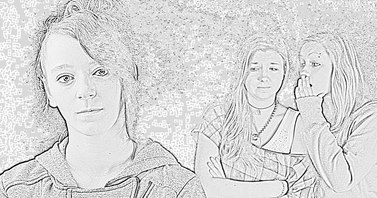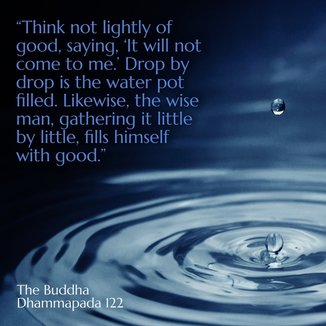 From Numerical Discourses sutta 4:73 Download "A person endowed with these four qualities can be known as 'a person of integrity.' Which four? "There is the case where a person of integrity, when asked, doesn't reveal another person's bad points, to say nothing of when unasked. Furthermore, when asked, when pressed with questions, he is one who speaks of another person's bad points not in full, not in detail, with omissions, holding back... "Then again, a person of integrity, when unasked, reveals another person's good points, to say nothing of when asked. Furthermore, when asked, when pressed with questions, he is one who speaks of another person's good points in full & in detail, without omissions, without holding back... "Then again, a person of integrity, when unasked, reveals his own bad points, to say nothing of when asked. Furthermore, when asked, when pressed with questions, he is one who speaks of his own bad points in full & in detail, without omissions, without holding back... "Then again, a person of integrity, when asked, doesn't reveal his own good points, to say nothing of when unasked. Furthermore, when asked, when pressed with questions, he is one who speaks of his own good points not in full, not in detail, with omissions, holding back... "Monks, a person endowed with these four qualities can be known as 'a person of integrity.'"  Dhp 122. One should not think lightly of good and say, “It will not come to me.” Even a water-vessel is filled by the falling of one drop after another; Even so a wise man fills himself with good, though he gather it little by little. This religious instruction was given by the Teacher while he was in residence at Jetavana with reference to Treasurer Catfoot, Biḷālapādaka. For once upon a time the residents of Sāvatthi banded themselves together and gave alms to the Congregation of Monks presided over by the Buddha. Now one day the Teacher, in returning thanks, spoke as follows, “Lay disciples, here in this world one man himself gives, but does not urge others to give; in the various places where he is reborn, such a man receives the blessing of wealth but not the blessing of a retinue. A second man does not himself give, but urges others to give; in the various places where he is reborn, such a man receives the blessing of a retinue but not the blessing of wealth. A third man neither himself gives nor urges others to give; in the various places where he is reborn, such a man receives neither the blessing of wealth nor the blessing of a retinue. Lastly, a man both himself gives and urges others to give; in the various places where he is reborn, such a man receives both the blessing of wealth and the blessing of a retinue.” Read what happens next... Or listen to the talk
"pubbeva me, bhikkhave, sambodhā anabhisambuddhassa bodhisattasseva sato etadahosi:
"Before my enlightenment, O monks, while I was still a bodhisatta, it occurred to me: 'ko nu kho loke assādo, ko ādīnavo, kiṃ nissaraṇa'nti? 'What is the gratification in the world, what is the danger in the world, what is the escape from the world?' tassa mayhaṃ, bhikkhave, etadahosi: Then it occurred to me: 'yaṃ kho lokaṃ paṭicca uppajjati sukhaṃ somanassaṃ, ayaṃ loke assādo. 'Whatever pleasure and joy there is in the world, this is the gratification in the world; yaṃ loko anicco dukkho vipariṇāmadhammo, ayaṃ loke ādīnavo. that the world is impermanent, bound up with suffering, and subject to change, this is the danger in the world; yo loke chandarāgavinayo chandarāgappahānaṃ, idaṃ loke nissaraṇa'nti. the removal and abandoning of desire and lust for the world, this is the escape from the world,' yāvakīvañcāhaṃ, bhikkhave, evaṃ lokassa assādañca assādato ādīnavañca ādīnavato nissaraṇañca nissaraṇato yathābhūtaṃ nābbhaññāsiṃ, "So long, monks, as I did not directly know, as they really are, the gratification in the world as gratification, its danger as danger, and the escape from the world as escape, neva tāvāhaṃ, bhikkhave, sadevake loke samārake sabrahmake sassamaṇabrāhmaṇiyā pajāya sadevamanussāya 'anuttaraṃ sammāsambodhiṃ abhisambuddho'ti paccaññāsiṃ. for so long I did not claim to have awakened to the unsurpassed perfect enlightenment in this world with its devas, Māras, and Brahmā, in this population with its ascetics and brahmins, its devas and humans. yato ca khvāhaṃ , bhikkhave, evaṃ lokassa assādañca assādato ādīnavañca ādīnavato nissaraṇañca nissaraṇato yathābhūtaṃ abbhaññāsiṃ, "But when I directly knew all this, athāhaṃ, bhikkhave, sadevake loke samārake sabrahmake sassamaṇabrāhmaṇiyā pajāya sadevamanussāya 'anuttaraṃ sammāsambodhiṃ abhisambuddho'ti paccaññāsiṃ. then I claimed to have awakened to the unsurpassed perfect enlightenment in this world with ... its devas and humans. ñāṇañca pana me dassanaṃ udapādi: 'akuppā me vimutti , ayamantimā jāti, natthi dāni punabbhavo"'ti. paṭhamaṃ. The knowledge and vision arose in me: 'Unshakable is the liberation of my mind; this is my last birth; there is now no more renewed existence.'" © Bhikkhu Bodhi, The Numerical Discourses of the Buddha (Wisdom Publications, 2012)  May even my enemies hear talk of the Dhamma. May even my enemies devote themselves to the Buddha's bidding. May even my enemies associate with those people who — peaceful, good -- get others to accept the Dhamma. May even my enemies hear the Dhamma time & again from those who advise endurance, forbearance, who praise non-opposition, and may they follow it. For surely he wouldn't harm me, or anyone else; he would attain the foremost peace, would protect the feeble & firm. Irrigators guide the water. Fletchers shape the arrow shaft. Carpenters shape the wood. The wise control themselves. Read the entire sutta: MN 86: Angulimala Sutta |

|
LocationMahamevnawa Buddhist Monastery Winnipeg at the Buddha Meditation Center Winnipeg 2610 St Mary’s Road, Winnipeg, MB R2N 4A2 204 869 5272 [email protected] We sometimes take photos of our events and post them on our website. If you would like us to take down any images you appear in across any of our platforms, please let us know and we will be happy to remove them. |
Learning
Quick Links
Our Branches
We gratefully recognize that our monastery rests on the traditional territory of Anishinaabeg, Cree, Oji-Cree, Dakota, and Dene peoples, and the homeland of the Métis Nation.
|

 RSS Feed
RSS Feed

